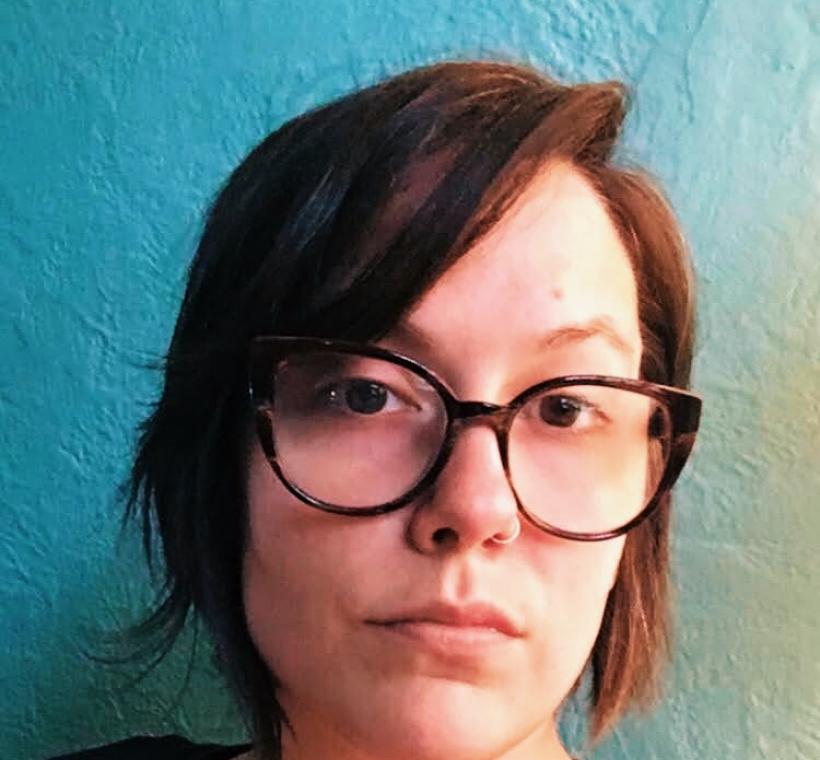
Molly M. Pearson
Tell us about yourself:
I’m from Lincoln, Nebraska, and now based in St. Louis, Missouri. I’m a writer, educator, and organizer. I work with universities, advocacy and social service agencies, LGBTQ organizations, and cultural institutions to engage in critical dialogue on sexuality, culture, and systems. I’m also a member of the What Would an HIV Doula Do? (@wwhivdd) collective, an interdisciplinary community of people joined in response to the ongoing AIDS crisis.
Through interactive workshops, presentations, and cohort experiences, I create spaces that help us imagine and move toward the future we all deserve, where no one is punished for how they enjoy, utilize, present, or exist in their body. I champion exploration, trying new things, and relishing the messiness along the way. Some of my writing can be found at TheBody and Out in STL.
I am very new to working with audio. Just one month into the New Voices cohort, and I’ve already learned so much more than I ever could have learned on my own.
A piece of yours or project (in any medium) that you'd like to share.
Harm Reduction is Not a Metaphor, an online zine created in partnership between the What Would an HIV Doula Do? collective, MoMA PS 1, and Visual AIDS.
What draws you to storytelling?
I grew up immersed in the performing arts - my three queer parents were drag queens, actors, directors, costumers, and make-up designers - so I’ve always known and felt the power of stories and creative expression. It was in 2017, when I was selected as a Storytelling Fellow at a St. Louis-based organization called Campfire, that I realized how tangibly effective storytelling can be to move people to action, shift thinking, and expand empathy. Stories help us make meaning out of the things that happen to us and the things that we do, and they help us finding meaning in one another. Stories help us understand how much we need each other.
What excites you the most about being a New Voices Scholar?
I’ve been collecting audio interviews of queer elders from my hometown since 2017, but felt totally stuck when I tried to figure out what to do with it all. When you google “how to start a podcast,” there are all these service pieces and lists out there that make it sound too easy. I don’t want to sit down with a friend, hit record, chat for an hour, and call it a podcast. I want to create something with teeth. I want to create something that moves people. I realized that the last thing I want to produce is an audio project that is slapped together and badly edited. I wanted to treat these stories with reverence and the care they deserve. New Voices is exactly what I was looking for in order to explore and build the skills I need to create work I can be proud of.
What’s playing on your radio/audio streaming service right now?
I’ve assigned a lot of podcasts for a class on Human Behavior I’m teaching this fall at my MSW alma mater, so lately I’m listening to all kinds of things that have to do with human development and the life course. We recently listened to several episodes of “This Teenage Life,” a podcast by and for adolescents (with the assistance of a trusted adult), to help our section on adolescent psychological development come to life. Each episode is only 10-15 minutes long, yet so effective in communicating the teenage experience with depth and charm.
What’s the most underrated tool (technical or not) that you use in your creative process?
Pen and paper. Truly. There is nothing like scheduling, planning, processing, creating, and drafting with a pen and paper. A pen feels like a more direct channel between my heart and mind and the world around me.
What is something you want to see more of in the industry?
Grant funding support and creative residencies for independent podcasting. It’s time that more funders of creative work view podcasting as a legitimate form of expression and culture making.
Who/What are your radio/audio inspirations and why?
Tobin Low and Kathy Tu, co-creators and co-hosts of “Nancy.” Every episode feels so generous. It’s fun and lighthearted, full of heart, and each episode is exquisitely edited.
I also love Sharon Mashihi and her experimental, semi-autobiographical, semi-fictional podcast “Appearances.” She pushes the limits of the podcast form in a way I haven’t heard anywhere else!
Anything else you'd like to add?
Can’t think of anything! :)